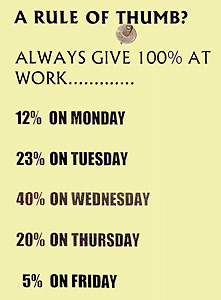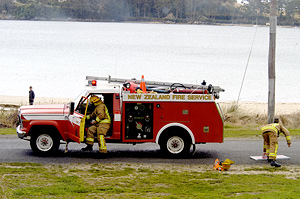|
|
Stewart Island hat 17 km geteerte Strassen und
noch einige km Naturstrassen dazu. Es kommt nicht so darauf an, holperig
und eng können alle sein. Zu Ehren des kürzlichen Polizei Triathlons
wurden wieder einmal die Mittelmarkierungen aufgefrischt, wo es genügend
Platz für zwei Spuren hat. Noch mehr 50 km Schilder wurden aufgestellt,
nicht dass es mehr als eine gerade Strecke gibt, auf der man ca. 2 km lang
schneller fahren könnte.
Alle Autos müssen mit der Fähre über die Foveaux Strait hergebracht
werden. Hier empfängt sie dann ein unerbittliches salziges Meerklima, wo
immer sich das Auto befindet. Logischerweise werden deshalb nicht die
neuesten und besten, sondern die praktischen und zuverlässigsten Fahrzeuge
gekauft. Die Strassen und das Klima tun dann das Übrige. Trotzdem sollten
alle Fahrzeuge dem normalen Sicherheitsstandard von Neuseeland
entsprechen.. Schönheit ist zwar nicht gerade Trumpf bei den Autos, aber
einige handbemalte Exemplare haben schon Seltenheitswert. Sogar Fahrzeuge
Marke Eigenbau sind hier zu sehen
Überrascht waren wir als eines Morgens das kleinere Feuerwehrfahrzeug vor
unserem Haus anhielt. Ich habe mich schnell erkundigt, ob wir evakuieren
müssten, wurden aber sofort beruhigt. Die Strasse wurde wegen eines
Fahrrad Unfalles in der nächsten Kurve zurückgehalten. Zum Glück ging es
für die kleine Tochter von Jessyca vom DoC mit ein paar Schürfungen und
einem dicken Verband glimpflich ab. Sie ist jetzt wieder voll hergestellt.
Rob Fox, der hiesige Polizist, hat allen säumigen Autobesitzern eine kurze
Frist gegen um die halbjährliche Kontrolle aus zu führen, nachdem er 18
Monate geduldig nur gemahnt hat. Als äusserstes Mittel kündigt er
Polizeiverstärkung vom Festland an, für welche niemand besondere Freude
empfindet.
 Unser Toyota Kleinbus hat denn auch sein „Warrant of Fitness“ für 6 Monate
bekommen. Trevor McLellan, der Chefmechaniker für alle Fahrzeuge und
teilweise auch Boote arbeitet seit vielen Jahren auf Stewart Island. Er
repariert sämtliche vorhandenen Marken, Pkws, Lastwagen, Traktoren etc.
Wenn er nicht weiter weiss, ruft er einen Kollegen auf dem Festland an.
Nur die computerisierten modernen Fahrzeuge, kann er nicht mehr retten.
Die müssen mit der Fähre aufs Festland zurück zur Reparatur, aber von
denen gibt es hier nicht viele. Kürzlich musste beim Polizeiauto eine neue
Kupplung eingebaut werden. Zu viert wurde das Getriebe entfernt und das
neue Teil das vom Festland hergeschickt wurde, eingebaut. Kein Problem.
Die meisten hier verstehen etwas von Autos und können zumindest mitreden.
Trevor hat die Auslegung der geltenden Gesetze auf praktische Weise den
Stewart Island Gegebenheiten angepasst, trotzdem garantiert er 100 %ige
Arbeit.. So kommt teilweise auch die Bezahlung in lokaler Währung. Ein
Kunde hat Trevor einen grossen Salm mitgebracht. Trevors Frau wird ihn
räuchern. Am Freitag muss Trevor zum Zahnarzt aufs Festland, dort wird der
Fisch nun geräuchert wieder die Hand wechseln. Als Zahlungsmittel gelten
auch Austern, Blue Cod, Langusten oder Muscheln, je nach Saison. Unser Toyota Kleinbus hat denn auch sein „Warrant of Fitness“ für 6 Monate
bekommen. Trevor McLellan, der Chefmechaniker für alle Fahrzeuge und
teilweise auch Boote arbeitet seit vielen Jahren auf Stewart Island. Er
repariert sämtliche vorhandenen Marken, Pkws, Lastwagen, Traktoren etc.
Wenn er nicht weiter weiss, ruft er einen Kollegen auf dem Festland an.
Nur die computerisierten modernen Fahrzeuge, kann er nicht mehr retten.
Die müssen mit der Fähre aufs Festland zurück zur Reparatur, aber von
denen gibt es hier nicht viele. Kürzlich musste beim Polizeiauto eine neue
Kupplung eingebaut werden. Zu viert wurde das Getriebe entfernt und das
neue Teil das vom Festland hergeschickt wurde, eingebaut. Kein Problem.
Die meisten hier verstehen etwas von Autos und können zumindest mitreden.
Trevor hat die Auslegung der geltenden Gesetze auf praktische Weise den
Stewart Island Gegebenheiten angepasst, trotzdem garantiert er 100 %ige
Arbeit.. So kommt teilweise auch die Bezahlung in lokaler Währung. Ein
Kunde hat Trevor einen grossen Salm mitgebracht. Trevors Frau wird ihn
räuchern. Am Freitag muss Trevor zum Zahnarzt aufs Festland, dort wird der
Fisch nun geräuchert wieder die Hand wechseln. Als Zahlungsmittel gelten
auch Austern, Blue Cod, Langusten oder Muscheln, je nach Saison.
Es gibt eine einzige Benzhinzapfsäule. Es kann schon vorkommen, dass ein
Zettel an der Säule klebt: „Kein Benzin bis am Freitag das Frachtboot
herüberkommt“. Für Diesel steht ein Tankwagen auf dem Gelände, aus dem
jeweils die Dieselfahrzeuge betankt werden. Trevor zeigt uns mit einigem
Stolz die uralte Gasabfüllpumpe während unsere Patrone für die Heizung
abgefüllt wird. Er hat zwar auch eine ganz moderne Pumpe, die ist aber zu
langsam und steht dekorativ in der Ecke.
Die Autos werden gefahren, bis sie auseinander fallen. Dann werden sie
entweder zur Befestigung von Strassen oder Strandböschungen verbaut, oder
einfach irgendwo sich selber und dem Rost überlassen, bis sie sich
auflösen oder sich vielleicht eine Wiederverwendung aufdrängt.
Wheels
Stewart Island owns 17 km of tar sealed road and about as many unsealed.
No matter, both are about evenly uneven. In honour of the Police Triathlon
a couple of weeks ago, the road markings were renewed, wherever the road
was wide enough and some more speed limits at 50 km were installed. Not
that there was much road which was even enough to speed over 50.
All cars come from the mainland via the ferry over Foveaux Strait. Here
they are confronted with a salty sea climate wherever they are. Logically
the cars here are not the newest and best looking, but the most
serviceable and reliable. Beauty is not trumps, but some of the vehicles
have been hand painted and sport a certain charm. There are even custom
built cars here. The roads and the climate are harsh enough on them.
Despite that, they are expected to conform to the normal New Zealand Road
Safety standards.
 We were astonished to see the smaller of the fire engines stop in front of
our house one morning. I went immediately to enquire whether we had to
evacuate, but were told, that they just had to block the traffic because
of a bicycle accident up the road. Luckily the little daughter of Jessyca
from DoC only had minor cuts and some abrasions which were sent to by the
local nurse. She is fully cured by now. We were astonished to see the smaller of the fire engines stop in front of
our house one morning. I went immediately to enquire whether we had to
evacuate, but were told, that they just had to block the traffic because
of a bicycle accident up the road. Luckily the little daughter of Jessyca
from DoC only had minor cuts and some abrasions which were sent to by the
local nurse. She is fully cured by now.
Rob Fox, the local Police Officer has put his foot down and sent reminders
to all vehicle holders, which have not complied with the laws giving a
short notice to fix the problem, after he has been patient for 18 months.
The ultimate measure to remedy the still defunct unsafe vehicles was, to
bring in outside enforcement teams, which nobody really wants.
Even our Toyota bus got his overdue “Warrant of Fitness” just in time.
Trevor McLellan, mechanic of all cars, lorries, tractors and even boats on
the island, works since many years on the Island. He repairs all brands.
If he does not know any further, he calls a colleague on the mainland.
Only the modern, computer diagnosed cars, are beyond his means, they have
to go back on the ferry to the mainland for repairs, but there are very
few of those here. Recently the police car needed a new clutch. He worked
with 3 others to remove the gearbox and put in the new part, which has
been sent from the mainland. No problem. Everybody here has some
mechanical sense, or can at least talk about it. Trevor has applied the
existing laws to the local needs in a practical way, but still guarantees
100 % work. Sometimes the payment comes in local currency. One client
brought a big Salmon, which Trevor’s wife will smoke. On Friday, when
Trevor has to go to the dentist to the mainland, the salmon will change
hands again. Other currencies are also Oysters, Mussels, Blue Cod or
Crayfish depending on the season.
The only petrol pump on the island sits here. It can happen, that there is
a notice on it: “ No petrol until Friday’s freight ferry is in.” For
Diesel there sits a truck in the yard out of which the vehicles get their
fuel. Trevor shows us the pump to fill the gas bottles while ours is
replenished. It is an antiquity. He has a brand new one, but it is too
slow and remains decoratively in a corner.
The cars are used until the break down. They then are either used to
reinforce some roadside, or seaside bank, or just simply let to rot
wherever there is a little space, and to await possibly more glorious days.
|